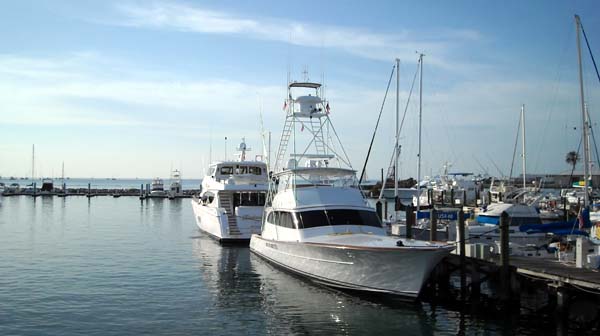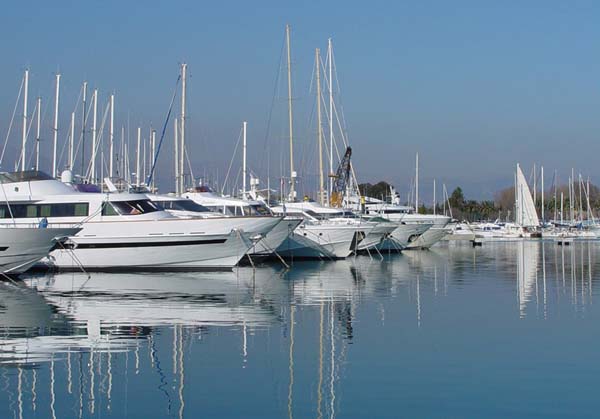Yacht Insurance Terms and Glossary
Complete Yacht Insurance Terminology
- Abandonment
Giving up the proprietary rights in insured property to the underwriter in exchange for payment of a constructive total loss.

- Actual Total Loss
- The insured property is completely destroyed; or
- The insured is irretrievably deprived of the insured property; or
- Cargo changes in character so that it is no longer the thing that was insured (e.g., cement becomes concrete); or
- A ship is posted "missing" at Lloyd's, in which case both the ship and its cargo are deemed to be an actual total loss.
- Adventure
The exposure of property to risk at sea.
- All Risks
All fortuitous causes of loss. It does not embrace inevitable loss such as wear and tear.
- Annual Policy
Designed for clients with small turnover of Goods in Transit. A deposit premium is paid and this is adjusted at the end of the year based on declarations made.

- Application
A written form submitted to underwriter to obtain quotation for a risk, and contains particulars of the risk.
- Assignment
The passing of beneficial rights from one party to another.
- Average
Partial loss or damage.
- Average Adjuster
Appointed by the shipowner to prepare General Average Statement
- Average Clause
The clause in marine policy which sets out the coverage provided in the event of partial loss.
- Average Irrespective of Percentage
Indicates that partial losses will be paid regardless of any franchise or percentage.

- Avoidance
The right of an underwriter, in the event of a breach of good faith or delay in commencement of an insured voyage to step aside from the insurance contract and to treat it as though they had never accepted the risk.
- Barratry
A criminal or wrongful act by the ship's master or crew causing loss or damage to the ship or cargo.
- Benefit of Insurance Claim
A clause by which the bailee of goods claims the benefit of any insurance policy effected by the cargo owner on the goods in care of the bailee. Such a clause in a contract of carriage issued in accordance with the Carriage of Goods by Water Act is void at law.

- Bottom Limit
The maximum value at risk per shipment/sending/aircraft.
- Certificate of Insurance
-
A document presented by the insurance company or insured as evidence that insurance is in effect. The insured may assign his rights under this negotiable document to a third party, usually the consignee, by endorsing the reverse of the certificate.
- Charter Party
-
The contract evidencing the agreement of a shipowner to lease his vessel to another person or firm.
- Co-Insurance
-
Where two or more parties share the same risk. A co-insurer is not obliged to follow the decision of another co-insurer, except where they have given authority for the other party to act on their behalf. Each co-insurance is a separate contract with the insured.
- Collision
-
Physical impact between two or more ships or vessels used for navigation. In collision liability insurance, the term does not include contact of the insured vessel with anything other than a ship or vessel.
- Compromised Total Loss
-
An arranged settlement on a hull policy where there is not claim for actual or constructive total loss, but where it is impractical to repair the vessel.
- Constructive Total Loss
-
The position which exists when the cost of repairing or recovering lost or damaged property plus the value of the salvage would exceed the property's value when repaired or recovered.
- Contingency Insurance (Seller's Insurance)
-
A secondary insurance coverage which will protect an insured's financial interest if the primary insurance coverage effected by others does not respond for a covered loss.
- Contribution
-
This relates to situations where more than one party covers the risk. Each party is deemed to be liable for its portion of the loss. If the insured has recovered in full from one insurer, that insurer is entitled to recover from the other insurer that part of the loss which should have been paid by the latter. The term, as used in marine insurance, also applies to contributions paid by the insured in connection with salvage and/or General Average.
- Contributory Value
-
The value of property saved as a result of a General Average Act which forms the basis for determining each party's contribution in General Average.
- Cover Note
-
A non-negotiable document evidencing insurance which may or may not indicate the terms of coverage.
- Custom Broker
-
A firm which specializes in clearing imported merchandise for transit to the interior. Normally responsible for obtaining and submitting all documents for clearing merchandise through customs and arranging inland transport as well as paying all charges related to these functions.
- Customs Entry Form
-
A form required by Canada Customs for all merchandise entering Canada. It indicated country of origin, description of merchandise and amount of estimated duty to be paid before merchandise is released by customs.
- Declaration
-
Form used by insured in reporting shipments under an Open Cargo Policy when no evidence of insurance is required.
- Deductible
-
A specific dollar amount, or percentage of the insured value, which will be deducted from all losses recoverable under a policy.
- Disclosure
-
The duty of the insured and his broker to tell the underwriter every material circumstance before acceptance of risk.
- Earned Premium
-
This applies when insurance is terminated before the expiry date of the insured period. The earned premium attaching to the period during which the underwriters have been on risk.
- Excess Liabilities
-
Insurance to cover the excess amount of liability for general average contributions, salvage claims, sue and labour charges and three-fourths collision liability where the full amount is not covered by a hull policy.
- Free of Particular Average, American Conditions (FPAAC)
-
Average clause which limits recovery of partial losses to those caused by fire, stranding, sinking or collision.
- Free of Particular Average, English Conditions (FPAEC)
-
Same as FPAAC except that the partial losses referred to are recoverable if the vessel has stranded, sunk, burned, been on fire in collision, regardless of whether such losses were actually caused by any of these perils.
- Franchise
-
Like a deductible, but if the amount of the merchandise is met or exceeded, the loss is paid in full.
- General Average
-
Loss arising through a voluntary sacrifice of any part of the ship or cargo, or an expenditure, to safeguard the ship and the rest of the cargo.
- General Average Contribution
-
Such losses or expenditures are contributed to by all the interest at risk on the basis of their respective values.
- General Average Bond
-
Document require of cargo owners, after a GA loss, obtaining their agreement to pay any contribution that may become due.
- Held Covered
-
A provisional acceptance of risk, subject to confirmation that cover is needed at a later date. Where applicable to an existing insurance, coverage is conditional, in practice, on prompt advice to the underwriter as soon as the insured is aware of the circumstances to be held covered coming into effect, and a reasonable additional premium is payable if the risk covered comes into effect.
- Insurable Interest
-
It is illegal for anyone to insure without an insurable interest, or in the case of marine insurance, a reasonable expectation of acquiring such interest. In general one has such interest when one's relationship to property at risk may expose one to loss or liability where one stands to gain by the safety of the property.
- Jettison
-
Throwing the cargo or ship's property overboard to save other property from a common danger.
- Letter of Credit
-
Method of payment between buyer and seller. The buyer opens a Letter of Credit in favor of the seller at his local bank by depositing the amount of the purchase price and dictating certain documents which the seller must present in order to obtain a payment. The Letter of Credit will be sent to a bank in the vicinity of the seller and upon presentation of the documents called for, the local bank will release payment.
- Material Circumstances
-
Any circumstances which would influence the judgment of a prudent underwriter in determining whether to accept a risk and the amount of premium to change.
- Material Representation
-
A statement made to the underwriter before acceptance of risk which is material to the decision in accepting and rating the risk.
- Non-Disclosure
-
The failure of the insured or their broker to disclose a material circumstance to the underwriter
before acceptance of the risk. A breach of good faith.
- Notice of Abandonment
-
A condition which must precede a constructive total loss. If the insured fails to give notice to the
underwriter, the loss can be treated only as a partial loss unless an actual total loss is proven. An
underwriter who accepts notice admits liability for the loss. Notice is not necessary where it would not benefit the underwriter, where the underwriter waives the obligation or in the case of a re-insurance provided the policy incorporates the "waiver" clause, action taken by an underwriter
to prevent or reduce the loss is not deemed to be an acceptance of abandonment.
- Overage Additional Premium
-
All additional premiums charged on an open cover declaration where the carrying vessel is outside the scope of the classification clause. It may be applied, also, to additional premium charged for breach of navigational warranties (e.g., institute warranties) where the ship is more than 15 years
old.
- Particular Average
-
A particular loss caused by marine perils, other than a General Average loss.
- Perils of the Sea
-
Hazards arising on navigable waters through natural forces such as abnormally heavy seas, high winds, etc.
- Proximate Cause
-
The most direct cause of loss, that is, the most effective, but not necessarily the last, in a series of
events.
- Recovery
-
The amount recovered from a third party responsible for a loss on which a claim has been paid.
- Representation
-
A statement of fact made by the insured or their broker when negotiating insurance with the underwriter.
-
The deliberate casting away or destruction of property to prevent greater loss. General Average
sacrifice is for the common good and saved interests make good the sacrifice in proportion to the
saving enjoyed.
-
There is an implied warranty in every voyage policy that the ship must be seaworthy at the
commencement of the insured voyage or, if the voyage is carried out in stages, at the
commencement of each stage of the voyage. To be seaworthy, the ship must be reasonably fit in
all respects to encounter the ordinary perils of the contemplated voyage, properly crewed, fuelled
and provisioned, and with all her equipment in proper working order. Cargo policies waive breach
of the warranty except where the insured or their servants are privy to the unseaworthiness.
Breach of the warranty is not excused in a hull voyage policy, literal compliance therewith being
required.
Although there is no warranty of seaworthiness in a hull time policy, claims arising from unseaworthiness may be prejudiced if the ship sails in an unseaworthy condition with the knowledge of the insured.
-
An underwriter's representative who is authorized to settle claims.
-
The reward payable to salvors for saving life and property at sea.
-
"One Off" insurance for those clients who require transit cover on an infrequent basis.
-
The right of the underwriter to step into the shoes of the insured, following payment of a claim, to recover the payment from a third party responsible for the loss. Subrogation is limited to the amount paid on the policy.
-
Charges incurred by an insured in averting or diminishing a loss. They are recoverable in addition to the full sum insured.
- Utmost Good Faith
-
A basic principle of insurance. Mutual trust in negotiating an insurance contract. The insured and
their broker must disclose and truly represent every material circumstance to the underwriter
before acceptance of the risk. A breach of good faith entitles the underwriter to avoid the
contract.
- Voidable Policy
-
Where the underwriter has the right to avoid a policy (e.g., in the event of a breach of good faith),
the policy is termed "voidable."
- Without Prejudice
-
Occasionally claims may be paid which the underwriter feels are not actually covered by the policy. Such payments are "without prejudice" and are not to be treated as a precedent for future similar claims.
- York/Antwerp Rules
-
An international code governing General Average.
Contact Us for more info or for an Insurance Quote over the phone.
